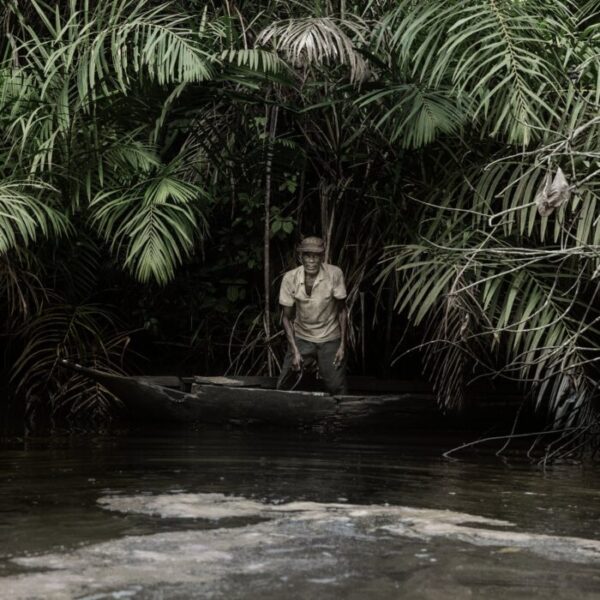National Issues
Oil Exploration And Exploitation In The Niger Delta Region -By Unuafe Ufuoma Rosemary

The oil exploration industry which is major centered in the Niger Delta region is without doubt currently the most important earner of foreign exchange to the Nigerian economy. Oil exploration by multinational and local companies poses social, health and economic challenges in the society. The right set of policies can equip society to meet these challenges on time. The Niger Delta is a home to an extraordinary variety of people, mostly fishers and farmers with a history of rich cultural heritage. However, the region is suffering from devastating oil pollution.
Although the effect of oil spillage depend on factors such as size or area of spill and geographical location, the socio-economic and environmental costs of oil pollution can be extensive. These ranges from destruction of wildlife, biodiversity loss, air and water pollution, degradation of farmland and damage to aquatic ecosystems. Also, the quantity of oil being wasted in this land can be beneficial to the Nigerian economy but instead, they are ragged by people.
The Niger Delta region is known to be strategically important to both the domestic and international economies. It is also a region of great wealth as well as poverty. The region lies over one of the biggest oil reserve on planet Earth with over 34 billion barrels of black gold. In 2005, Nigeria produced 2.6 million of barrels of crude oil per day thus making Nigeria to be the sixth largest net exporter of crude oil in the world.
The reverse is the case now. The situation in the Niger Delta regions are unbearable that the United Nations Development Programme describes the situation in the Niger Delta as a region suffering from administrative neglect, crumbling social infrastructure and services, high rate of unemployment, social deprivation, abject poverty, filth, squabble and endemic conflict. No other sentence describes squarely the condition in which more than 30 million people have found themselves as a result of oil exploration and exploitation. The situation has progressively continued to deteriorate, chiefly as a result of what many have described as the non-chalance of the stakeholders and oil companies in the region- with little or no insight.
Oil spillage and gas flaring which is the most referenced form of pollution resulting from oil exploration and exploitation in the Niger Delta region have had grievous consequences on the people of the Niger Delta region. The situation has affected the living conditions of the people who depend solely on the environment for their subsistence, ranging from fishing, agricultural activities, portable water, recreational activities e.g swimming. The incidence has continued for decades and still threatens any hope for a substantive living.
Oil exploitation which has resulted to oil spillage have been a common phenomenon in Nigerian oil-producing states after the discovery of crude oil in Oloibiri particularly between 1970s and the 1990s. During this time, a total number of 4,647 spills leaked about 2,369,470 barrels of oil into the Niger Delta. The Department of Petroleum Resources (DPR) reported different figures of spills, between 1976 and 1996, about 4,835 barrels of oil per year were spilled into the Delta environment, 7,350 barrels spilled per year through the operations of Shell-BP into the Ijaw and Delta oil fields between 1989 and 1994. The military in the Niger Delta region have also paved way for the exploitation of oil.
The Niger Delta has been the centre of international controversy as a result of the countless incidence of pollution, corruption and human rights violations which have resulted in the break out of various conflicts and arm struggle within the region over the years. The military among the youths has no doubt contributed massively to the vandalization of pipeline in the Niger Delta region due to marginalization, abject poverty, massive unemployment and under-development attributed to the region. Although the Niger Delta has immense oil wealth, the region has subjected to under-development, giving rise to military in the regions. For the Niger Delta, it is paradoxical that it is not only underfed, starving to death but a nightmare and source of misery to the people.
The chronic and cumulative negative effects of oil exploration and extractive activities of oil companies which have been unmitigated and endemic since the discovery oil in commercial quantity has become worrisome. Crude oil exploration and the negative externalities do occur, there must be proactive mitigating measures to cushion their negative effects on humans, especially the environment which is man’s greatest resource.
In the midst of these, the stakeholders who generate these externalities have not done enough as any genuine and worthwhile effort aimed at mitigating these negative externalities created as a result of oil exploration and exploitation caused by the Nigerian state, the international community. The people of the region and civil societies must adopt international best practices which must be holistic and indigenously sustainable without further endangering the present and future environment and generation of Niger Delta people. The impact of oil drilling activities that came with discovery of oil in the Niger-Delta cannot be gainsaid as the harsh impacts (antithesis), must generate strategic mitigation (synthesis) to enhance sustainable balance and mutual co-existence between the humans and the environment.
There are basically three factors in the domestic environment that can influence the political, economic, social and environmental dynamics of oil politics in Nigeria. These are government, MNOCs and the local people (militants, civil societies, title holders and elites). This means that any credible and sustainable solutions aimed at mitigating the negative externalities of oil exploration and exploited activities must come from these factors notwithstanding the important roles of the international communities. The government must take the lead in the mitigation without which the problems will continue to persist. Successive governments in Nigeria have been negligently culpable in demonstrating sincere political will to revise, update and implement to the latter all legislations and policies to bring about transparency; end corruption, improve the economic well-being of the people by properly managing the oil resource of the region in the interest of equity, restructuring the lol industry and social justice to end the pains and destruction of the Niger-Delta.
The government should also enact more conservation laws and legislations like the Petroleum Act 1969 which can be beneficial to mitigate the excesses of oil exploration and exploitation in the government. The people of Niger-Delta must adopt a judiciously planned, controlled and dedicated program to ensure adequate preservation of the pristine nature of the environment through the implementation of the Land Use Act and the Petroleum Act 1969, which vests all lands and oil wealth in the country to the Federal Government. The oil bearing communities can be made to manage their oil resources or retain a sizable part of the proceeds from oil. The Petroleum Industry Bill before the National Assembly should be passed into law and implemented to ensure local participation in the oil industry which can be monitored by the government in the interest of social justice and fairness. International and national initiatives can be undertaken by the Nigerian government to stop illegal trade in stolen crude from the Niger-Delta through the issuance of certificates for import and export to prevent unauthorized participants to address illegal exploitation in the region.
These measures and more will aid to mitigate conflicts and social unrest in the region and also stem down the tide of oil exploitation and exploration externalities in Niger-Delta.
UNUAFE UFUOMA ROSEMARY



















